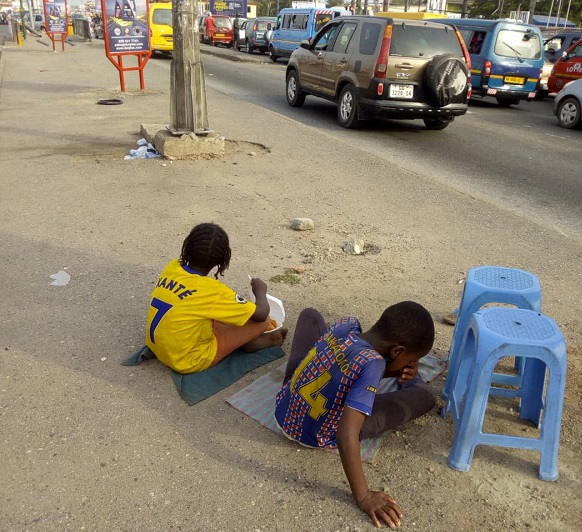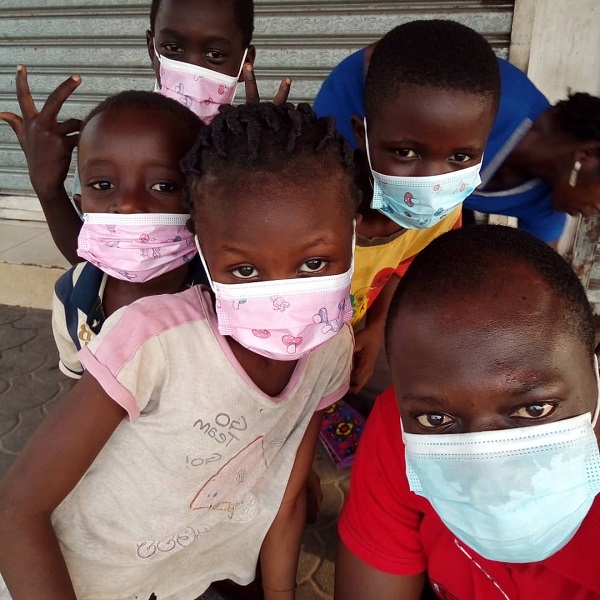![]()

Ordeal of street children amid COVID-19
Every morning, he and his siblings allocate some busy streets of Accra to themselves, where they will pitch camp and beg for alms to support themselves.
Advertisement
The Kaneshie section of the Busia Highway has been Ibrahim’s abode for many years.
He jostles with many other children to win the benevolence of charitable motorists and commuters who ply the route.
This has been his routine since he arrived in Ghana with his mother as a toddler.
His fluency in the Akan language gave some indication that he had been in Ghana for quite sometime.
Contracting the virus
Amid the COVID-19 pandemic, Ibrahim sticks to his routine with no protection--No social distancing and no mask.
Shabbily dressed in a dirty jersey shirt and trousers, he leans against vehicles in traffic and pesters commuters by holding their dresses and sometimes hands to catch their attention.

The reporter with some of the children in mask
In an interaction, Ishmael said he had heard the word “coronavirus” but had neither any idea what it was nor was he aware of the preventive protocols.
Other Trending Stories
“I have heard about it but I don’t know what it is,” he said amidst laughter.
The Mirror observed that many street children are ignorant about the disease, like Ibrahim is.
Unfortunately, their environment make them more vulnerable to the disease as they are exposed to different groups of people and the unhygienic conditions under which they live.
Another street child, Adiza, 10, who operates at the Kwame Nkrumah Interchange area, said she had seen many people put on nose masks but had no idea why they wore them.
“I see people put on the mask but my mother, as well as my siblings and my friends here, do not wear some.
Someone gave me one last week but I took it off after some time,” she said, removing a dirty nose mask from her pocket.
But Kofi, 13, also a street child, had knowledge of the virus but goes about his duties without a nose mask, explaining that “I cannot afford it.”
“My mother told me that it is a deadly disease. I used to wear a nose mask but the one I was using got torn and I have not been able to purchase another one,” he told The Mirror.
Marginalised
Unlike other children who are privileged to go to school and receive continuous education, these children continue to be marginalised with no access to basic necessities such as nose masks and hand sanitiser to protect them from the dreadful virus.
Even if these children had knowledge about the dangerous nature of the virus, compliance with the protocols would be difficult as they lament a drastic drop in income over the past few months because many people now shy away from giving them money.
“Previously, I used to make about GH₵20 a day. Now I make not more than GH₵5. A lot of people push us away when we get close to them,” Ibrahim lamented.
Rights of children
The United Nations Convention on the Rights of the Child (UNCRC) enjoins all member countries to guarantee the civil, political, economic, social and cultural rights of every child, regardless of their race, religion or abilities.
A report by Child Rights International in November 2020 revealed that 2,180 children below 18 years contracted the COVID-19 virus in Ghana between March 11, 2020, and November 9, 2020.

The mothers of some of the children usually pitch camp along the streets
There is not enough data to give a true picture of the number of street children in the country.
It is, however, estimated that they could be more than 90, 000.
In an interview, the Executive Director of Child Rights International, Mr Bright Appiah, expressed concern that there had not been any intervention so far targeted at supporting street children during the pandemic.
He said although some individuals and organisations had provided food for some vulnerable children, such interventions were not done under any strict protocols to ensure that the children were protected.
“We need not to even find them on the street at all. We need a very comprehensive framework in order to deal with this particular issue. Parts of the activities are criminal and parts are socially oriented. Therefore, in tackling this issue, I think that there is a need for us to look at how best we can respond to legislation,” he proposed.
There is no concrete indication in sight that this problem will be addressed.
As the days go by, it is very likely that these children could be infected by the virus which has killed and harmed many in the country.





